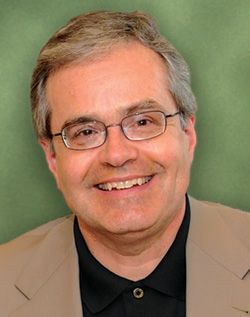Another Look by David Faust
 Talking with a coworker about plans for an upcoming banquet, I said, “Even if 20 people attend, it will be worthwhile.” She smiled and replied, “I was thinking we should plan for 500 guests.” Evidently I wasn’t thinking big enough.
Talking with a coworker about plans for an upcoming banquet, I said, “Even if 20 people attend, it will be worthwhile.” She smiled and replied, “I was thinking we should plan for 500 guests.” Evidently I wasn’t thinking big enough.
Decades ago a church sold some extra property it owned because, as noted in the board meeting minutes, the grassy land was “too much to mow.” Years later the congregation found itself landlocked because someone hadn’t thought big enough.
The disciples were worried. A crowd had gathered in a remote place to hear Jesus teach, and the people were hungry. Undaunted, Jesus turned a lad’s fish platter into a feast fit for thousands, with 12 baskets of food left over. The disciples weren’t thinking big enough.
In the first seven chapters of the book of Acts, Jesus’ followers stayed close to home and preached the gospel only to their fellow Jews. It took the pain of persecution and special signs from God to move them across ethnic boundaries to all nations, as Jesus had instructed them. At first, they weren’t thinking big enough.
In his book Your God Is Too Small (Simon & Schuster, 2004), J. B. Phillips listed some misguided ways people think about God—flawed assumptions that diminish the Lord’s true grandeur. Likewise, we’re thinking too small if we do not allow God’s Word to shape our outlook.
Our worldview is too small if we’re emotionally self-centered. If you’re all wrapped up in yourself, you make a very small package. Imagine how the world would be different if everyone lived by Philippians 2:4: “Each of you should look not only to your own interests, but also to the interests of others” (NIV, 1984).
Our worldview is too small if we’re intellectually arrogant. Images captured by the Hubble Telescope reveal the complexity, beauty, and immensity of outer space. Forty-year-old Adam Riess, an astronomer at the Space Telescope Science Institute and a professor in physics and astronomy at The Johns Hopkins University, was awarded the 2011 Einstein Medal by the Albert Einstein Society in Bern, Switzerland. According to a press release posted at www.hubblesite.org/newscenter, the Society recognized Riess for leading a study that involved “difficult and precise measurements across seven billion light-years” and resulted in the 1998 discovery of accelerated expansion of the universe propelled by a mysterious, unexplained “dark energy.” However, the press release adds, “exactly what dark energy is and how it behaves remain among the most pressing questions in astrophysics today.” Hmmm. “Dark energy” may be one of the most important discoveries of our time, but we don’t understand what it is or how it behaves! Maybe instead of Hubble we ought to call it the Humble Telescope. The more we learn about the universe, the more reasonable it seems to bow humbly before the Creator whose power and intelligence designed it. “The heavens declare the glory of God; the skies proclaim the work of his hands” (Psalm 19:1).
Our worldview is too small if we’re spiritually short-sighted. “Set your minds on things above, not on earthly things,” says Colossians 3:2—because the physical world is passing away. As an astrophysicist struggles to explain a universe beyond comprehension, so the Christian wrestles with mysteries of faith that stretch beyond what our eyes can see, our ears can hear, or our minds can conceive (1 Corinthians 2:9); yet we dare not diminish or deny heavenly realities simply because they are difficult to fully explain. If we forget that God “is able to do immeasurably more than all we ask or imagine” (Ephesians 3:20), we’re not thinking big enough.



Comments: no replies